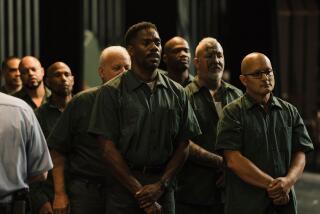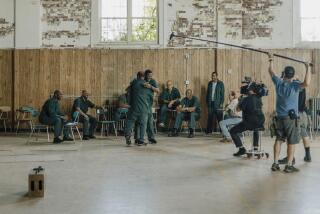‘Reality’ is a turning point for lead actor and prisoner
Plenty of actors will say that performing freed them, but Aniello Arena really means it. The star of “Reality,” a new film from Italian director Matteo Garrone, Arena is a former mafia hit man 20 years into serving a lifetime prison sentence for murder.
In the movie, which opens in Los Angeles on Friday, Arena plays Luciano, a Neapolitan fishmonger who becomes obsessed with appearing on the Italian version of the reality show “Big Brother.” The film won the Grand Prix at last year’s Cannes Film Festival, in large part on the strength of its wide-eyed and charismatic leading man; Garrone discovered him after seeing Arena perform a monologue dressed as a clown in a theater troupe at Tuscany’s Volterra Detention Center.
A surrealist comedy that darkens as Luciano’s delusion grows, “Reality” is about the contagion of yearning as Luciano and his friends and family, including his loving wife, Maria (Loredana Simioli), begin to envision a life of fame and wealth.
PHOTOS: Hollywood backlot moments
“Aniello’s face was perfect for this character,” Garrone said over a plate of rigatoni at a Beverly Hills restaurant recently. “The eyes are pure. It’s about illusion, so you have to be naive. The performance is unique because he combines the talent as an actor with the fact that he stayed for 20 years in jail. You can see in the eyes the surprise of the discovery of a world.”
“Reality” is a tonal shift from Garrone’s last movie, “Gomorrah,” a gritty 2008 drama based on a book about a Neapolitan organized crime syndicate. “Gomorrah,” too, won the Grand Prix at Cannes and was an international hit, earning Garrone enough clout in Italy to make “Reality,” a more expensive and quirkier movie, this time starring a real-life gangster.
Garrone originally attempted to cast Arena in “Gomorrah,” but prison authorities felt the content of the film was not appropriate, Garrone said. Arena, 44, grew up in Naples among the gangs, and was jailed for participating in the murder of three members of a rival clan while in his early 20s. At trial, Arena admitted involvement with organized crime, but said he was innocent of the murders. He has served time in roughly a dozen Italian institutions over the last 20 years, including one in Naples that he described as “a living hell.”
“When I first landed in prison in 1993, I wasn’t like I am today,” Arena said, in an interview via Skype and with the help of a translator, from a cultural center across the street from the Tuscan prison. “I didn’t think that much. I was only angry — angry at society, at the entire world.”
Like the character he plays in “Reality,” Arena is earnest and quick to laugh. Since 1999, he has been a member of Volterra’s theater troupe, Compagnia della Fortezza (Theater of the Fortress), a well-regarded company founded by theater director Armando Punzo. Italy has a robust tradition of prison theater, with more than 100 such companies currently operating. Over the years, Arena has played characters as varied as Jiminy Cricket, the antichrist and his personal favorite, drag queens.
“The years pass and you start reflecting on yourself and what you’ve done,” he said. “You start looking at yourself in the mirror. But the real turning point came when I went to Volterra. I started getting immersed in culture.... The experiences I had outside before I was jailed and in the first six or seven years of prison, I didn’t believe in human beings, I didn’t believe in humanity. But in working on different characters, in trying to flesh them out and in looking at the world through their eyes, I started believing in human beings again.”
Though Garrone was unable to cast Arena in “Gomorrah,” he didn’t forget him. When he decided to make “Reality,” which is based on the real-life experience of Garrone’s brother-in-law, he wanted all the actors to have what he calls “Pixar faces.” Many of Luciano’s family members — like Garrone’s Naples-born wife’s family, he said — have round bodies, moon-shaped faces and vivacious personalities.
“The story of Luciano is the story of many people I know,” said Garrone, who grew up in Rome, the son of a theater critic. “They have everything, but they are not satisfied. They follow some desire, some artificial paradise. For me, it was a fairy tale. I wanted it to be very colorful, and the faces to be very expressive.”
PHOTOS: SXSW 2013: 13 must-see films
Arena had already been allowed out of prison on day passes to perform with his theater group, so securing permission to make the movie seemed, to him and to Garrone, a small hurdle. Garrone provided the prison with a detailed shooting schedule, and scouted the nearest jails where Arena would sleep at night.
But a week before “Reality” was set to go into production with Arena as its lead, prison authorities declined Arena’s request — they told Garrone they were concerned about negative media attention that would result from the film, an answer that enraged Garrone.
“If you teach to a prisoner to become an actor for many, many years and then finally a director wants him to play as a leading actor, it’s cruel,” the director said. “Don’t teach him to be an actor. Say, ‘OK, we don’t believe a prisoner can change in his life.’”
Ultimately Garrone enlisted a powerful judge he knew from making “Gomorrah,” who was able to secure Arena’s release, and they began shooting in Naples. For the three months it took to film “Reality,” Arena was allowed to leave jail during the day to go to the set, but went back to a cell each night to sleep.
Police made periodic visits to the set to check on Arena. On their first visit, he was dressed as a woman for a scene in which Luciano performs at a wedding. The policemen’s stunned reactions were so amusing to Garrone, he used them in the film.
Unbeknown to Garrone, the neighborhood he had selected to serve as a central location in the film, the market for Luciano’s fish shop, was precisely where Arena grew up and where many of his family still lived. Arena tried to keep it a secret that he was returning to the area, but word got out and familiar crowds started to gather.
“To come back after 20 years, it created all kinds of emotions,” Arena said. “All these memories of the person I used to be, so there was a lot of conflict between the good and the evil in me.”
According to Garrone, Arena has never informed on any of his fellow gang members, and has an intensity of dedication that can be useful on set.
“He’s very ... how do you say, focused?” Garrone said. “He brings this aspect of the character to Luciano. It was very important for him to understand emotionally each scene, because maybe he has less technique than the other actors. It’s important to bring him to the emotional temperature.”
Arena wasn’t allowed to attend “Reality’s” premiere at Cannes last year, but he did do a series of interviews to promote it. The movie was a more modest success in Italy than “Gomorrah,” Garrone’s breakout, but Arena has received praise from both film critics, who have cited the sense of merriness and wonder in his performance, and prison guards, who clap him on the back. “It’s good for the soul, that kind of positive attention,” he said. “Inside it felt great.”
Today Arena works at the cultural center during the day, and has a girlfriend. “I’m not gonna give you the details, but I do have a social life,” he said in response to a question about how they met.
Next year he’ll be eligible for conditional leave from prison, which means he’ll be allowed to live at home, but will still be monitored for five years.
He said he plans to continue to act, but won’t return to Naples.
“Theater is life,” Arena said. “It’s everything. It makes you feel free. I can’t imagine living without it.”
PHOTOS AND MORE
TIMELINE: Violence in movies
ENVELOPE: The latest awards buzz
PHOTOS: Greatest box office flops
More to Read
Only good movies
Get the Indie Focus newsletter, Mark Olsen's weekly guide to the world of cinema.
You may occasionally receive promotional content from the Los Angeles Times.








